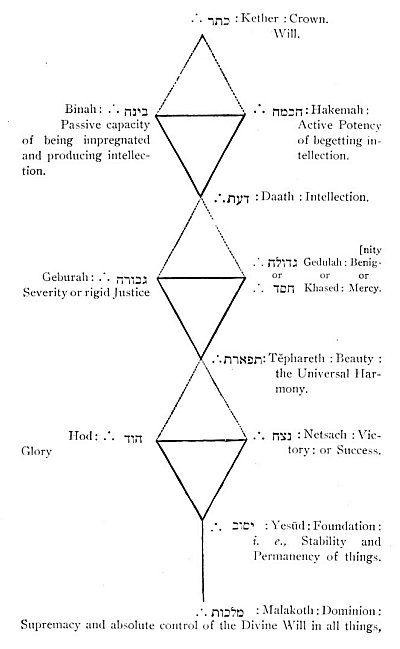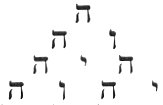Everything is contained in that word of four letters. It is the Azot of the Alchemists, the Thot of the Bohemians, the Taro of the Kabalists. It supplies to the Adept the last word of the human Sciences, and the Key of the Divine Power: but he alone understands how to avail himself of it who comprehends the necessity of never revealing it. If Œdipus, in place of slaying the Sphynx, had conquered it, and driven it into Thebes harnessed to his chariot, he would have been King, without incest, calamities, or exile. If Psyche, by submission and caresses, had persuaded Love to reveal himself, she would never have lost him. Love is one of the mythological images of the grand secret and the grand agent, because it expresses at once an action and a passion, a void and a plenitude, an arrow and a wound. The Initiates ought to understand this, and, lest the profane should overhear, Masonry never says too much.
When Science had been overcome in Alexandria by the fanaticism of the murderers of Hypatia, it became Christian, or, rather, it concealed itself under Christian disguises, with Ammonius, Synosius, and the author of the books of Dionysius the Areopagite. Then it was necessary to win the pardon of miracles by the appearances of superstition, and of science by a language unintelligible. Hieroglyphic writing was revived, and pantacles and
p. 733
characters were invented, that summed up a whole doctrine in a sign, a whole series of tendencies and revelations in a word. What was the object of the aspirants to knowledge? They sought for the secret of the great work, or the Philosophal Stone, or the perpetual motion, or the squaring of the circle, or the universal medicine; formulas which often saved them from persecution and general ill-will, by exposing them to the charge of folly; and each of which expressed one of the forces of the grand magical secret. This lasted until the time of the Roman de la Rose, which also expresses the mysterious and magical meaning of the poem of Dante, borrowed from the High Kabalah, that immense and concealed source of the universal philosophy.
It is not strange that man knows but little of the powers of the human will, and imperfectly appreciates them; since he knows nothing as to the nature of the will and its mode of operation. That his own will can move his arm, or compel another to obey him; that his thoughts, symbolically expressed by the signs of writing, can influence and lead other men, are mysteries as incomprehensible to him, as that the will of Deity could effect the creation of a Universe.
The powers of the will are as yet chiefly indefinite and unknown. Whether a multitude of well-established phenomena are to be ascribed to the power of the will alone, or to magnetism or some other natural agent, is a point as yet unsettled; but it is agreed by all that a concentrated effort of the will is in every case necessary to success.
That the phenomena are real is not to be doubted, unless credit is no longer to be given to human testimony; and if they are real, there is no reason for doubting the exercise heretofore, by many adepts, of the powers that were then termed magical. Nothing is better vouched for than the extraordinary performances of the Brahmins. No religion is supported by stronger testimony; nor has any one ever even attempted to explain what may well be termed their miracles.
How far, in this life, the mind and soul can act without and in-dependently of the body, no one as yet knows. That the will can act at all without bodily contact, and the phenomena of dreams, are mysteries that confound the wisest and most learned, whose explanations are but a Babel of words.
Man as yet knows little of the forces of nature. Surrounded,
p. 734
controlled, and governed by them, while he vainly thinks himself independent, not only of his race, but the universal nature and her infinite manifold forces, he is the slave of these forces, unless he becomes their master. He can neither ignore their existence nor be simply their neighbor.

Moe is the founder of GnosticWarrior.com. He is a father, husband, author, martial arts black belt, and an expert in Gnosticism, the occult, and esotericism.






